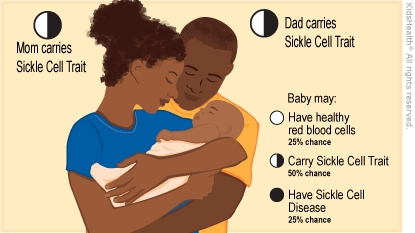Kids with sickle cell trait don't have sickle cell disease and won't get it. But they can pass a copy of the sickle cell gene to their children someday.
Sickle cell trait doesn't usually cause serious problems, but there are some health concerns that parents should know about. Follow these instructions to help your child grow up healthy.



Your child:

How does sickle cell trait happen? A child inherits sickle cell trait when they're born with one sickle cell copy of the beta-globin gene and one normal copy. The beta-globin gene tells the body how to make hemoglobin. Hemoglobin is an important protein in red blood cells that carries oxygen to the body.
What else should parents know as their kids grow up? Sometimes children or adults with sickle cell trait have blood in their pee. It's usually due to changes in the kidney and not serious. But rarely it can happen because of a type of kidney cancer. If your child has blood in their pee, talk to your child's health care provider.
Should I tell my child about their sickle cell "status"? When your child is ready, it's important to share their sickle cell status with them. When a person knows their sickle cell status: